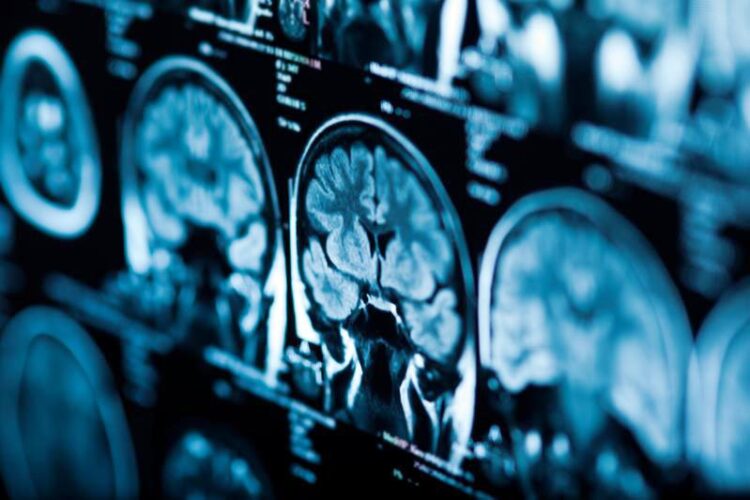Targeting brain tumors: new drug candidate in clinical trial

Images of a brain
Credit: ITM Isotope Technologies Munich SE
Clinical trials are a milestone in the development of safe and effective drugs and therapies. An antibody developed by Helmholtz Munich is now entering a phase 1 clinical trial. Together with the radiopharmaceutical company ITM Isotope Technologies Munich and Münster University Hospital, researchers hope to improve the treatment of patients with brain tumors.
Glioblastomas are the most common and aggressive malignant brain tumors. Surgical removal of the tumor and additional radiation and chemotherapy usually do not result in a complete cure. The life expectancy of patients is severely limited and the need for better treatment options is high. A new combination of an antibody that specifically detects cancer cells together with a radionuclide raises the hopes of Reinhard Zeidler, researcher at Helmholtz Munich and LMU Klinikum: “We believe that we can use this antibody to better treat glioblastomas and extend the life expectancy of those affected.”
Precise attack on tumor remnants
The promising antibody* is the result of many years of basic research. “We could not have developed this antibody to this point without a great deal of perseverance,” Zeidler says. “The reason it is so well suited for cancer therapy is that it can distinguish tumor cells from healthy cells much more precisely than chemotherapy, for example. Treatment therefore promises significantly fewer side effects.” Combined with a radionuclide from the radiopharmaceutical biotech company ITM, which destroys the targeted cancer cells with its radiation, the new drug candidate is entering a clinical trial conducted by Münster University Hospital and led by Prof. Walter Stummer. “Our goal is to eliminate completely any remaining cancer cells that could not be removed or destroyed with classical treatment,” Zeidler explains. In this way, the drug should prevent the tumor from re-growing or at least delay this process.
Launch of trials in German hospitals
In addition to Münster University Hospital, the university hospitals in Essen, Cologne and Wurzburg are offering treatments as part of this clinical trial. Patient recruitment for the study is currently ongoing. Further details can be found in the press release of ITM Isotope Technologies Munich: https://www.itm-radiopharma.com/news/press-releases/press-releases-detail/ITM,_H…
*Learn more about the antibody developed by Helmholtz Munich:
The antibody binds specifically to the enzyme carbonic anhydrase XII, which is found exclusively on cancer cells in the brain – presumably, because it is of great importance for their rapid growth. Coupled to lutetium-177, a radioactive emitter, the antibody has a dual effect: first, it inhibits the enzyme, and second, it directs lutetium-177 specifically to tumor cells that could not be eliminated by standard therapies and that form the origin of a new tumor. The radiation released during the radioactive decay of lutetium-177 destroys the tumor cells in the immediate environment.
About the scientist
Prof. Reinhard Zeidler, Research Group Leader “Therapeutic Antibodies” at Helmholtz Munich and the Ludwig-Maximilians-University (LMU) Klinikum.
Contact: zeidler@helmholtz-muenchen.de
Wissenschaftliche Ansprechpartner:
Prof. Reinhard Zeidler, Research Group Leader “Therapeutic Antibodies” at Helmholtz Munich and the Ludwig-Maximilians-University (LMU) Klinikum.
Contact: zeidler@helmholtz-muenchen.de
Media Contact
All latest news from the category: Life Sciences and Chemistry
Articles and reports from the Life Sciences and chemistry area deal with applied and basic research into modern biology, chemistry and human medicine.
Valuable information can be found on a range of life sciences fields including bacteriology, biochemistry, bionics, bioinformatics, biophysics, biotechnology, genetics, geobotany, human biology, marine biology, microbiology, molecular biology, cellular biology, zoology, bioinorganic chemistry, microchemistry and environmental chemistry.
Newest articles

Innovative 3D printed scaffolds offer new hope for bone healing
Researchers at the Institute for Bioengineering of Catalonia have developed novel 3D printed PLA-CaP scaffolds that promote blood vessel formation, ensuring better healing and regeneration of bone tissue. Bone is…

The surprising role of gut infection in Alzheimer’s disease
ASU- and Banner Alzheimer’s Institute-led study implicates link between a common virus and the disease, which travels from the gut to the brain and may be a target for antiviral…

Molecular gardening: New enzymes discovered for protein modification pruning
How deubiquitinases USP53 and USP54 cleave long polyubiquitin chains and how the former is linked to liver disease in children. Deubiquitinases (DUBs) are enzymes used by cells to trim protein…



